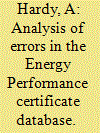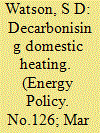| Srl | Item |
| 1 |
ID:
166543


|
|
|
|
|
| Summary/Abstract |
Energy Performance Certificates (EPCs) are the adopted method by which the UK government tracks the progress of its domestic energy efficiency policies. Over 15 million EPCs have been lodged, representing a valuable resource for research into the UK building stock. However, the EPC record has a reputation of containing multiple errors. In this work, we identify many such errors and quantify how common they are. We find that 27% of EPCs in the open EPC record display at least one flag to suggests it is incorrect and estimate the true error rate of the EPC record to be between 36 and 62%. Many of these errors are caused by EPC assessors disagreeing on building parameters such as floor type, wall type and built form. Additionally, flats and maisonettes appear to cause more issues than other property types. This may be due to difficulties in assessing their location in the building and the nature of the surrounding space. We also suggest potential new methods of quality assurance which rely on machine learning and which could allow such errors to be avoided in the future.
|
|
|
|
|
|
|
|
|
|
|
|
|
|
|
|
| 2 |
ID:
163527


|
|
|
|
|
| Summary/Abstract |
Around 80% of domestic heat demand in Great Britain (GB) is supplied by natural gas, but continuing to heat dwellings in this way is unlikely to be compatible with national emission reduction targets. Electrical heating using heat pumps is expected to play a significant role in future space heating and hot water provision. The assessment of future heating technologies requires knowledge of the current demand for heat at short time intervals in order to evaluate peak demands and possible storage requirements. Existing half-hourly national heat demand estimates are built on data from small samples of dwellings. This paper provides estimates of GB domestic heat demand under mild, normal and cold weather conditions based on data from over 6000 dwellings collected between May 2009 and July 2010 that participated in the GB smart meter trial. The calculated peak domestic heat demand of 170 GW is around 40% lower than previously calculated suggesting that the difficulties surrounding the electrification of heat are far less profound than previously assumed. These results can be used in the development of future energy pathways and scenarios.
|
|
|
|
|
|
|
|
|
|
|
|
|
|
|
|
| 3 |
ID:
124408


|
|
|
|
|
| Publication |
2013.
|
| Summary/Abstract |
The UK Government's Department for Energy and Climate Change has been investigating the feasibility of developing a national energy efficiency data framework covering both domestic and non-domestic buildings. Working closely with the Energy Saving Trust and energy suppliers, the aim is to develop a data framework to monitor changes in energy efficiency, develop and evaluate programmes and improve information available to consumers. Key applications of the framework are to understand trends in built stock energy use, identify drivers and evaluate the success of different policies. For energy suppliers, it could identify what energy uses are growing, in which sectors and why. This would help with market segmentation and the design of products. For building professionals, it could supplement energy audits and modelling of end-use consumption with real data and support the generation of accurate and comprehensive benchmarks. This paper critically examines the results of the first phase of work to construct a national energy efficiency data-framework for the domestic sector focusing on two specific issues: (a) drivers of domestic energy consumption in terms of the physical nature of the dwellings and socio-economic characteristics of occupants and (b) the impact of energy efficiency measures on energy consumption.
|
|
|
|
|
|
|
|
|
|
|
|
|
|
|
|
| 4 |
ID:
150446


|
|
|
|
|
| Summary/Abstract |
This paper investigates the effect of Energy Performance Certificate (EPC) ratings on residential prices in Wales. Drawing on a sample of approximately 192,000 transactions, the capitalisation of energy efficiency ratings into house prices is investigated using two approaches. The first adopts a cross-sectional framework to investigate the effect of EPC rating on price. The second approach applies a repeat-sales methodology to investigate the impact of EPC rating on house price appreciation. Statistically significant positive price premiums are estimated for dwellings in EPC bands A/B (12.8%) and C (3.5%) compared to houses in band D. For dwellings in band E (−3.6%) and F (−6.5%) there are statistically significant discounts. Such effects may not be the result of energy performance alone. In addition to energy cost differences, the price effect may be due to additional benefits of energy efficient features. An analysis of the private rental segment reveals that, in contrast to the general market, low-EPC rated dwellings were not traded at a significant discount. This suggests different implicit prices of potential energy savings for landlords and owner-occupiers.
|
|
|
|
|
|
|
|
|
|
|
|
|
|
|
|